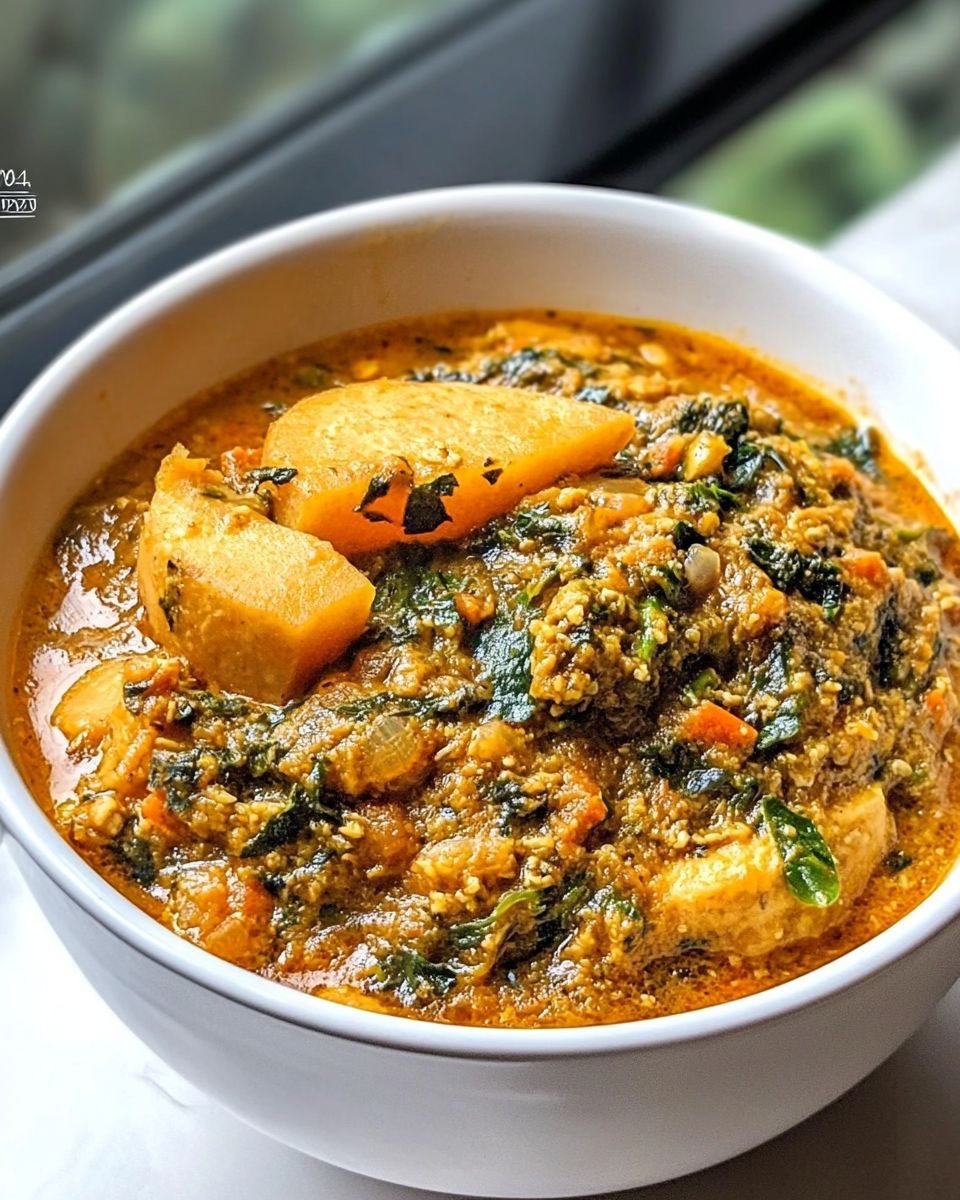Egusi Soup is a quintessential West African dish celebrated for its rich flavors and wholesome ingredients. Made with ground melon seeds, it delivers a nutty, savory taste that pairs beautifully with the vibrant spices of traditional African cuisine. Whether served with fufu or pounded yam, this soup is a comforting meal perfect for sharing with loved ones.
The versatility of Egusi Soup allows for endless customization. From incorporating different greens to experimenting with assorted meats and fish, this dish reflects the diversity of West African culinary traditions. Its hearty texture and robust flavor make it an ideal choice for any occasion, from casual family dinners to festive gatherings.
Full Recipe:
- 2 cups ground egusi (melon seeds)
- 1/2 cup palm oil
- 1 onion, chopped
- 2 cups spinach or bitter leaves
- 2 tablespoons ground crayfish
- 1 pound assorted meats (goat meat, tripe, etc.)
- 1/2 pound dried fish
- 2 cups meat stock
- 2 tablespoons ground pepper (adjust to taste)
- 2 Maggi cubes or bouillon cubes
- Salt to taste
Directions:
- Heat palm oil in a large pot over medium heat. Add the chopped onion and sauté until translucent.
- Mix the ground egusi with a small amount of water to form a thick paste, then add it to the pot. Stir continuously for about 5 minutes to fry the egusi.
- Pour in the meat stock gradually while stirring to dissolve the egusi paste into the stock.
- Add the assorted meats, dried fish, ground crayfish, and ground pepper. Stir to combine.
- Cover the pot and let it simmer for about 10 minutes, stirring occasionally.
- Add the spinach or bitter leaves, bouillon cubes, and salt to taste. Cook for another 5 minutes until the leaves are tender and the soup is well blended.
- Adjust the seasoning and serve hot with fufu, pounded yam, or rice.
Prep Time: 15 minutes | Cooking Time: 30 minutes | Total Time: 45 minutes
Kcal: 320 kcal | Servings: 8 servings
Egusi Soup: A Traditional West African Delight
Egusi soup is a beloved staple in West African cuisine, cherished for its rich, nutty flavor and hearty texture. This iconic dish, made with ground melon seeds and often paired with fufu or pounded yam, is a culinary treasure that carries the history and culture of the region in every bite. Whether served as a family meal or a celebratory dish, egusi soup stands as a testament to the diversity and richness of African cuisine.
The Origins of Egusi Soup
Egusi soup’s roots trace back to West Africa, where melon seeds (known as egusi) are a common ingredient in many traditional recipes. These seeds are harvested from a specific type of melon native to the region, dried, and ground into a fine powder. Historically, egusi soup has been a dish of sustenance, combining nutrient-rich ingredients that sustain communities through celebrations and daily meals.
The dish is particularly popular in countries like Nigeria, Ghana, and Cameroon, where it is prepared with regional variations that reflect the local culinary preferences and available ingredients. While the base of the dish remains consistent—ground egusi seeds cooked in a savory broth with meats, fish, and vegetables—the nuances of spices, greens, and accompaniments differ widely, adding to the dish’s versatility and appeal.
Why Egusi Soup Is More Than Just a Meal
Egusi soup is more than just a dish; it is a cultural experience. Sharing a bowl of this flavorful soup around a communal table fosters connection and togetherness, embodying the spirit of African hospitality. Each component of the soup is carefully chosen not only for its flavor but also for its nutritional benefits.
The soup is known for its high protein content, thanks to the egusi seeds, which are rich in essential amino acids, healthy fats, and vitamins. Combined with vegetables like spinach or bitter leaves and a variety of proteins such as goat meat, tripe, or dried fish, egusi soup is a balanced meal that provides essential nutrients. It’s no wonder this dish has been passed down through generations as a cornerstone of West African food traditions.
The Art of Making Egusi Soup
Crafting egusi soup is an art form that requires patience and attention to detail. The process begins with frying the ground melon seeds in palm oil, a step that unlocks their nutty aroma and gives the soup its characteristic depth of flavor. Adding meat stock, spices, and vegetables builds layers of flavor, resulting in a dish that is both hearty and indulgent.
West African cooks take pride in their methods, often incorporating family secrets or region-specific techniques to create their unique version of the soup. The choice of accompanying greens, the type of meat, and the balance of spices all contribute to the dish’s final taste and texture. The end result is a harmonious blend of flavors and textures that reflect the heart and soul of African cuisine.
Cultural Significance of Egusi Soup
Egusi soup is deeply embedded in the cultural fabric of West Africa. It is a dish that graces festive occasions, religious gatherings, and everyday meals alike. During celebrations such as weddings, birthdays, and naming ceremonies, egusi soup is often prepared in large quantities to feed guests, symbolizing abundance and hospitality.
The dish also plays a role in traditional healing practices. In some communities, egusi soup is prepared for nursing mothers to help restore their strength and nourish their bodies. Its rich blend of nutrients is believed to promote overall health and vitality, making it a treasured dish for both its culinary and medicinal value.
Variations Across West Africa
Although egusi soup has a foundational recipe, its variations across West Africa showcase the creativity and adaptability of African cooks. In Nigeria, for instance, the dish may include a mix of spinach, pumpkin leaves, or bitter leaves, each adding a distinct flavor profile. Some cooks add tomatoes to create a slightly tangy undertone, while others focus on the earthy richness of the melon seeds and meat.
In Ghana, egusi soup is often referred to as “agushi stew” and is typically served with kenkey or banku. The use of fish, particularly smoked or dried varieties, is common, lending the dish a smoky flavor that complements the nuttiness of the egusi. Meanwhile, in Cameroon, egusi soup may include okra for an added layer of texture, creating a unique spin on the classic dish.
How to Enjoy Egusi Soup
Egusi soup is traditionally enjoyed with starchy sides like fufu, pounded yam, eba, or amala. These accompaniments are used to scoop up the soup, allowing diners to experience its rich flavors in every bite. The combination of the soft, doughy texture of fufu with the thick, savory soup creates a satisfying and comforting meal.
The dining experience often involves eating with hands, a practice that enhances the connection to the food and the shared dining experience. In modern settings, however, some may opt for spoons or forks, especially when serving the dish to international guests unfamiliar with traditional African dining customs.
Health Benefits of Egusi Soup
Egusi soup is not only delicious but also highly nutritious. The melon seeds are an excellent source of healthy fats, protein, and fiber, making them a valuable ingredient for maintaining heart health and promoting digestive wellness. The inclusion of leafy greens adds a dose of vitamins A and C, while the variety of meats and fish contribute to the soup’s high protein content.
The palm oil used in egusi soup, while often debated in terms of health benefits, provides a source of vitamins E and K. When used in moderation, it can enhance the dish’s flavor without compromising its nutritional value. For those following specific dietary restrictions, egusi soup can be adapted to fit low-carb, keto, or vegetarian diets, showcasing its versatility as a health-conscious meal option.
Tips for Making the Perfect Egusi Soup
- Choose Quality Ingredients: The flavor of egusi soup hinges on the freshness of its ingredients. Use fresh melon seeds, high-quality palm oil, and vibrant greens for the best results.
- Balance the Spices: While egusi soup is known for its bold flavors, it’s important to balance the spices to suit your taste. Experiment with the amount of ground pepper, crayfish, and bouillon cubes to achieve your desired flavor profile.
- Customize the Protein: Egusi soup is incredibly versatile when it comes to protein options. Whether you prefer goat meat, chicken, fish, or a combination, ensure the meats are tender and well-seasoned to enhance the soup’s overall flavor.
- Experiment with Greens: Don’t hesitate to try different leafy vegetables to add variety to your egusi soup. Spinach, kale, and pumpkin leaves are popular choices that can be used individually or combined.
Conclusion: A Dish Worth Celebrating
Egusi soup is more than just a recipe; it is a celebration of West African culture, tradition, and flavor. Its rich history and adaptability make it a dish that resonates with people across the world, bridging cultural gaps through the universal language of good food. Whether you are preparing it for the first time or have cherished it as part of your heritage, egusi soup invites you to savor its complex flavors and immerse yourself in the warmth of African hospitality.
As you explore this iconic dish, remember that every bowl of egusi soup tells a story—of family, community, and the enduring joy of sharing a meal. So, gather your ingredients, embrace the art of West African cooking, and enjoy the unforgettable taste of egusi soup.






